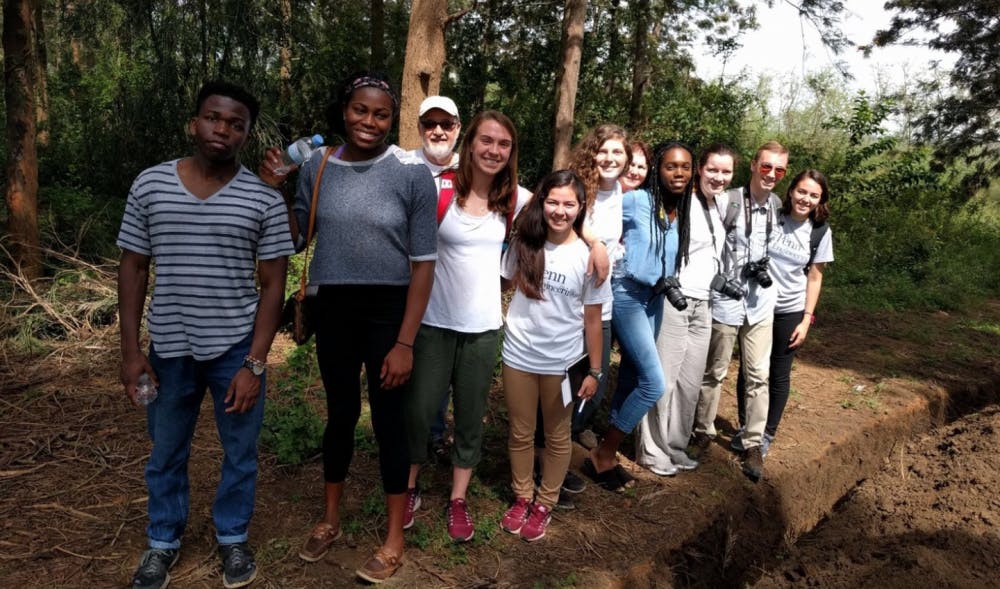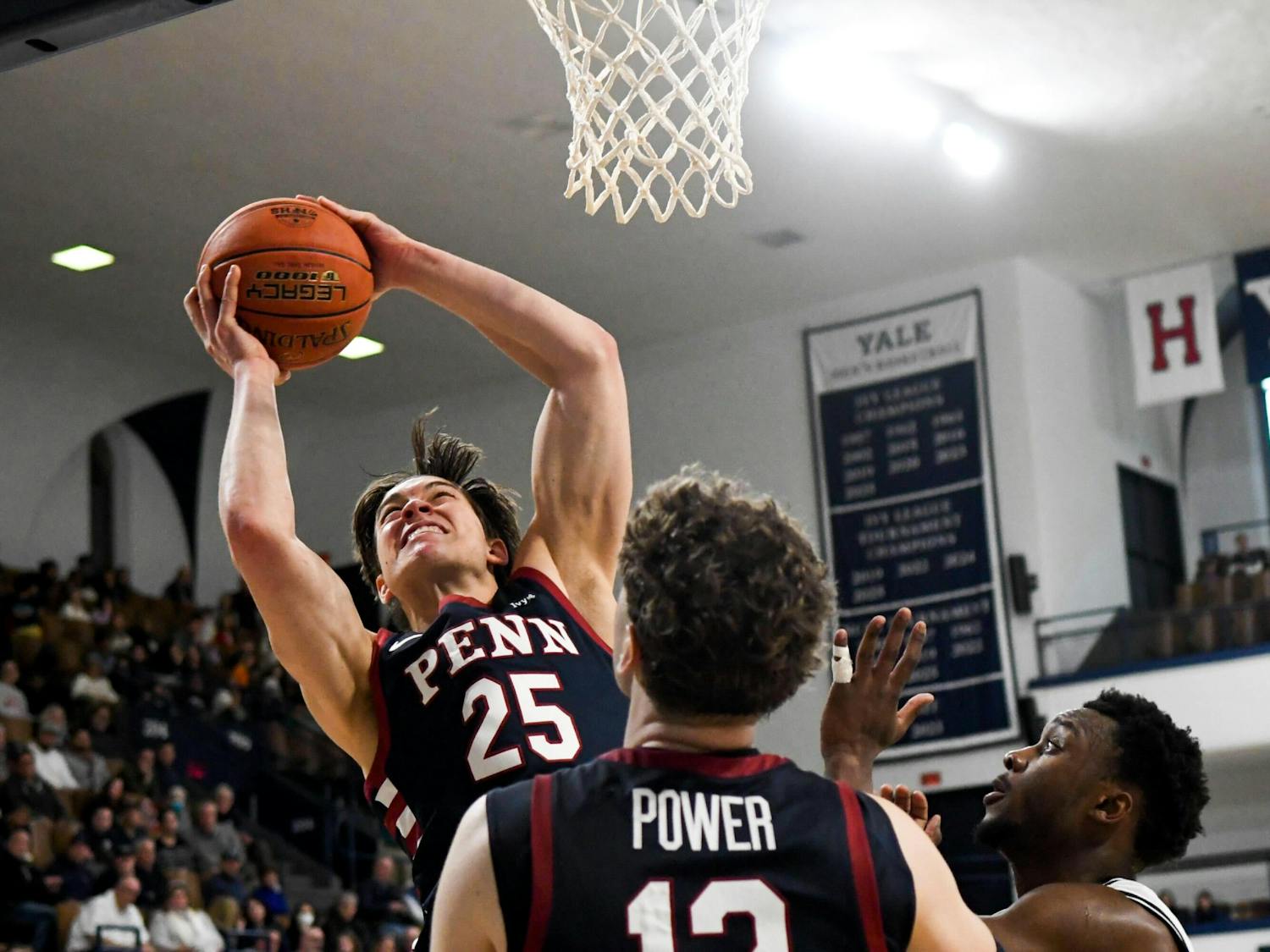Erica Higa really, really loved her first visit to Rwanda a year ago.
So much so, as a matter of fact, that the Penn women’s soccer rising senior felt that she had to convince a couple of friends to come along for round two.
In May, Higa was joined by teammates Kristen Miller and Kiera Towell as part of a group of roughly 15 students participating in the Penn School of Engineering and Applied Science’s third annual Rwanda Gashora program, a part of Penn’s Global Seminar Program designed to add a hands-on experience to an engineering course.
Over 18 days, the three teammates — in addition to Penn women’s basketball forward Princess Aghayere — partnered with the Gashora Girls Academy, working on several life improvement projects for the local boarding school’s students while also finding some time to bond with the natives on the athletic fields.
“It was definitely great to be able to engage in both soccer and engineering, because those are really the two things that make me who I am,” Higa, a Mechanical Engineering and Applied Mechanics major, said. “And I was really excited to be able to experience that with my teammates, because we know each other as teammates and friends at Penn, but going abroad together, doing service together and experiencing a whole new culture together can really make a relationship even better than it was before. So I’m just grateful to have been able to have gone to Rwanda for a second time, and to have done it with some of my best friends.”
Though Higa was a veteran of the Rwanda Gashora Program, having accompanied then-volleyball coach Kerry Major Carr a year ago, Miller and Towell both entered with no idea of what to expect on their first journey abroad. And as one would expect, it was Higa’s passion from her own first-ever trip that was able to push her teammates to take a similar leap of faith.
“I definitely encouraged as many of my teammates as possible to come with me, because I just thought it was such an amazing experience last year,” Higa said. “Kiera is an engineer so she heard about it through me and through Penn Engineering, and Kristen is in the College [of Arts and Sciences] so she mostly heard about it through me.”
Once arriving overseas, the trio of players blogged their journey day-by-day via Penn Athletics. Running with the primary themes of Information Communication Technology (ICT) and solar energy, the Penn students’ projects this year included installing “Raspberry Pi” modules [which Higa described as “mini-computers” with which both the Penn and Gashora students could write code and engage in electrical projects] and creating plans for solar-powered thermal showers to eventually bring hot water to the Gashora dorms.
Related:
Volleyball Issue | Penn coach Kerry Carr brought her skills and resources to Rwanda over the summer
Soccer's Higa, volleyball's Carr travel to Rwanda on service trip
But what Higa singled out as perhaps the most impactful project of all was actually a continuation of one started on her first trip a year ago: the water pipeline project. Before the efforts of Higa and her companions, ill patients at the Gashora Health Center would have to transport “jerrycans” filled with several gallons of water from a nearby lake to the facility — a path of roughly a mile — for their own medical treatment.
Thanks to the work of the Penn students, though, a solar-powered pipeline now transports water from the lake to the health center, ridding medically impaired patients of their previously existing need to make that grueling hike just to survive.
“It’s all very rewarding; I think the one thing that we focused on a lot is not just implementing [projects] and leaving, but actually teaching the Gashora girls, and the local community members, how to take ownership and make these projects their own so that they can be sustained longer,” Higa said.
“Each year we build upon our projects and share more information, but it’s really up to the girls here and and the community if they want to keep these projects alive. Going back this year was really exciting because I got to see some of the projects that we implemented last year still being used and still in place," Higa continued. "I think that’s the most rewarding thing, being able to teach the locals about what we’re doing rather than just seeing a project work — that’s really important, a part of technology that sometimes engineers can forget.”
Of course, even in the midst of such impactful life improvement work, the Penn women’s soccer trio couldn’t go so long without putting in a bit of work on the pitch. And with both the Gashora girls and younger local students, one thing was clear — even when juxtaposed with life-changing technological innovation, there’s just no replicating the bond that comes from old-fashioned playground fun.
“Our professors have told us a bunch of times that even an afternoon here and there that we’re able to go to one of the primary schools and bring a bunch of soccer balls, it’s so easy to create relationships when you have that mode of sports between you,” Higa said. “Technology is great and really exciting — especially for engineers, we can easily get excited over technology — but sport is just such an international language, and it makes the ice breakers a lot more fun and easier.”
Combine the mental cooperation involved in setting up the life-changing projects and the positive vibes that come from playing soccer with a trio of such accomplished athletes, and the result of that recipe is simple: relationships powerful enough to last a lifetime.
“My favorite part was hands down just having friendships and relationships with the girls at Gashora. [These friendships] carry out throughout the year; there were some girls that I met last year and got to come back and see, and it was like I never left,” said Higa, who added that a few Gashora graduates have enrolled at Penn. “They’re really excited to have visitors come in — especially since this year’s trip was a bit longer than last year, so we got to spend a bit more time with them — and they’re extremely welcoming. They’re some of the most brilliant girls I’ve ever met, and we all learn so much from them.”









